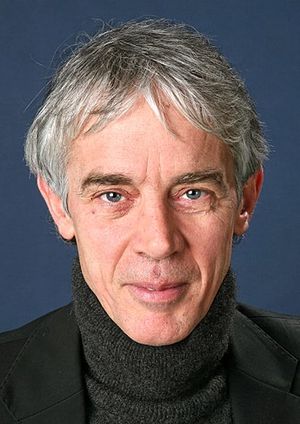Martin Vetterli
( engineer, academic) | ||||||||||||
|---|---|---|---|---|---|---|---|---|---|---|---|---|
 | ||||||||||||
| Born | 1957-10-04 | |||||||||||
| Nationality | Swiss | |||||||||||
| Alma mater | • ETH Zurich • Stanford | |||||||||||
| Interests | Mathematical signal processing | |||||||||||
Swiss academic who attended the 2016 Bilderberg and several WEF AGMs. Board member of Microsoft's CyberPeace Institute.
| ||||||||||||
Martin Vetterli is the president of École polytechnique fédérale de Lausanne (EPFL) in Switzerland.[1] He's a professor of engineering and attended the 2016 Bilderberg meeting as president of the National Research Council of the Swiss National Science Foundation.[2]
Career
Martin Vetterli received his electrical engineering degree from ETH Zurich in 1981, and then completed a Master of Science degree in electrical engineering at Stanford University in 1982. He later pursued his PhD at EPFL in 1986.
After his dissertation, he was an assistant and associate professor in electrical engineering at Columbia University in New York, and in 1993, he became an associate and then full professor at the Department of Electrical Engineering and Computer Sciences at the University of California at Berkeley in California.
In 1995, he joined EPFL as a full-time professor. He held several positions there, including chair of communication systems and founding director of the National Competence Center in Research on Mobile Information and Communication systems (NCCR-MICS). From 2004 to 2011, he was vice president of EPFL for international affairs and, from 2011 to 2012, he was the dean of the School of Computer and Communications Sciences at EPFL.
Martin Vetterli has made numerous research contributions in the general area of digital signal processing and is best known for his work on wavelets. He has also contributed to other areas, including sampling (signal processing), computational complexity theory, signal processing for communications, digital video processing and joint source/channel coding. His work has led to over 150 journal publications and to two dozen of patents.
In 2015, he was elected to the United States National Academy of Engineering for his contributions to the development of time-frequency representations and algorithms in multimedia signal processing and communications.[3]
From 2013 to 2016 he was the president of the National Research Council of the Swiss National Science Foundation, before being elected as the president of EPFL in Switzerland.[4]
CyberPeace Institute
Since September 2019, he has been part of the board of directors of the CyberPeace Institute in Geneva, an NGO that highlights the societal and human impact of cyberattacks.[5], funded by four main donors: Hewlett-Packard, the Ford Foundation, Mastercard and Microsoft. The CyberPeace Institute was created in September 2019, in parallel with the Swiss Digital Initiative, a foundation bringing together large companies such as Microsoft, Credit Suisse, Google, Huawei, Ringier and Swisscom. The creation of these two organizations succeeded the organization of the Geneva Digital Talks of 2017, an initiative launched by the president of Microsoft, Brad Smith, who wished to position Geneva as a global hub for the regulation of technologies related to the internet. Attacks on hospitals and "vaccination" centers during the "Covid-19 pandemic" were treated as a priority when the institute was created.[6]
Events Participated in
| Event | Start | End | Location(s) | Description |
|---|---|---|---|---|
| Bilderberg/2016 | 9 June 2016 | 12 June 2016 | Germany Dresden | The 2016 Bilderberg meeting took place in Dresden, Germany. |
| WEF/Annual Meeting/2016 | 20 January 2016 | 23 January 2016 | Switzerland WEF | Attended by over 2500 people, both leaders and followers, who were explained how the Fourth Industrial Revolution would changed everything, including being a "revolution of values". |
| WEF/Annual Meeting/2017 | 17 January 2017 | 20 January 2017 | Switzerland WEF | 2952 known participants, including prominently Bill Gates. "Offers a platform for the most effective and engaged leaders to achieve common goals for greater societal leadership." |
| WEF/Annual Meeting/2019 | 22 January 2019 | 25 January 2019 | Switzerland WEF | "The reality is that we are in a Cold War [against China] that threatens to turn into a hot one." |
| WEF/Annual Meeting/2020 | 21 January 2020 | 24 January 2020 | Switzerland WEF | This mega-summit of the world's ruling class and their political and media appendages happens every year, but 2020 was special, as the continuous corporate media coverage of COVID-19 started more or less from one day to the next on 20/21 January 2020, coinciding with the start of the meeting. |
| WEF/Annual Meeting/2022 | 22 May 2022 | 26 May 2022 | Switzerland WEF | 1911 guests in Davos |
| WEF/Annual Meeting/2023 | 16 January 2023 | 20 January 2023 | Switzerland WEF | The theme of the meeting was "Cooperation in a Fragmented World" |
References
- ↑ "Federal Council appoints Martin Vetterli President of EPFL", press release of the Swiss government, 24 February 2016.
- ↑ http://www.snf.ch/en/researchinFocus/newsroom/Pages/news-120302-presse-release-martin-vetterli-new-president-research-council-snsf.aspx
- ↑ https://www.nae.edu/130213.aspx
- ↑ http://www.snf.ch/en/theSNSF/organisation/board/Pages/default.aspx
- ↑ https://actu.epfl.ch/news/promoting-peace-and-helping-victims-in-cyberspace/
- ↑ https://genevasolutions.news/science-tech/paving-the-way-to-cyber-peace